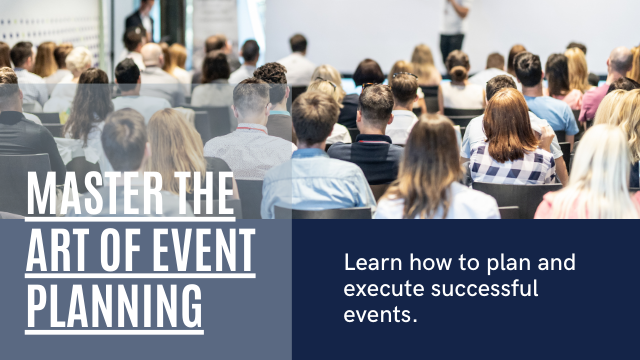Short Course Description
Events are more than just gatherings; they are moments in time, crafted with care and attention to detail. This self-paced workshop on Event Planning offers an immersive dive into the world of event management, ensuring every participant is equipped to create moments that resonate. From intimate charity events to grand business conferences, the art of event planning is diverse and dynamic.
In our Event Planning workshop, we move beyond the basics. Participants will delve deep into vendor management, ensuring security, liaising with technicians, and coordinating with wait staff. We'll touch upon the nuances of different event types, ensuring that each attendee leaves with a holistic understanding and practical skills to craft memorable events.
By the end of the workshop, participants will be adept at navigating the multifaceted world of event planning, armed with the knowledge and practical skills to orchestrate events that resonate with attendees and leave a lasting impression. Upon successful completion of this course, participants will be able to:
- Comprehensive Understanding: Define the critical elements of event planning and differentiate between various types of events, recognizing their unique requirements and nuances.
- Strategic Planning: Develop a holistic event blueprint, considering all aspects from conceptualization to execution, ensuring every event is both strategic and impactful.
- Stakeholder Collaboration: Establish effective communication and coordination strategies with various stakeholders, including vendors, technicians, security personnel, and wait staff, ensuring seamless event execution.
- Financial Acumen: Manage an event's budget efficiently, understanding where to allocate resources and how to optimize costs without compromising on quality.
- Risk Management: Identify potential challenges, from logistical hurdles to unforeseen circumstances, and devise proactive strategies to mitigate them, ensuring smooth event flow.
- Experience Design: Craft engaging event narratives and integrate design elements that elevate the overall attendee experience, ensuring each event is memorable.
- Feedback & Improvement: Implement feedback mechanisms to gather attendee insights and perform post-event analyses, ensuring continuous improvement and refining of event planning skills.
- Emergency Preparedness: Develop contingency plans to handle emergencies, ensuring attendee safety and minimal disruption.
- Networking & Collaboration: Build and nurture relationships within the event planning community, fostering collaborations and expanding their professional network.
- Ethical Considerations: Understand and adhere to ethical standards in event planning, ensuring transparency, fairness, and respect for all involved parties.
Instructor(s)
Guno Ritfeld


